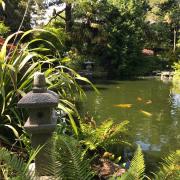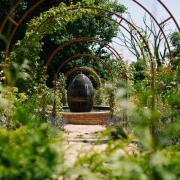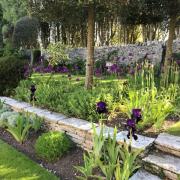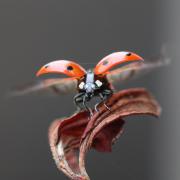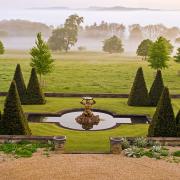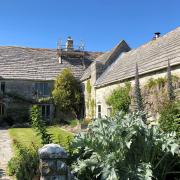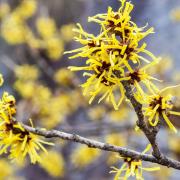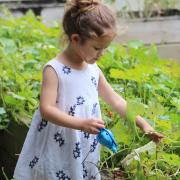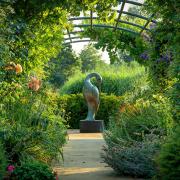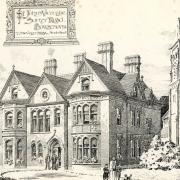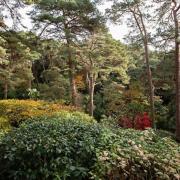Chelsea and Hampton Court Flower Show Gold Winner, Mary Payne, reveals the design secrets behind The Italian Garden at Compton Acres and how to recreate it at home
Playgrounds of the wealthy in days gone by, Italian gardens are designed to impress all who enter them. So the fact that The Italian Villa in Compton Acres is one of Dorset’s most popular wedding venues is no surprise. It is set in the most glorious Italian Garden which provides a stunning backdrop for any wedding photo. To create that Mediterranean feel we utilise three key elements - structure, symmetry and formality.
Scaled down structure
Structure in our Italian Garden comes from surrounding banks covered in a screen of rhododendron bushes, 32 encircling columns of weathered Bath stone, clipped pyramids of dark green yew and impressive statuary. We emphasise this impressive structure by growing Clematis montana ‘Elizabeth’ along chains between the columns. Linking everything together with long swathes of pink flowers in late spring, the ‘Elizabeth’ clematis would be a spectacular choice for a terrace fence or garden wall at home. It is sure to add structure and continuity to even the smallest Italian style garden.
A large cross-shaped pool forms an attention-grabbing focal point in The Italian Garden. This is enhanced by an ornately carved fountain, floating on the water are clusters of water lilies under which shoals of koi carp can be seen flashing past. The pool beautifully reflects both light and colour. Whatever the size of your garden, even a small pool or water feature ringed with attractive plants will create a delightful structural focal point.
Heated symmetry
In grass-bordered beds around the central pool, we plant large quantities of brightly coloured tulips to provide a vivid display of fiery red and yellow in spring, this is succeeded by orange and red flowered begonias in summer. By arranging these plants in intricate shapes, we create the elaborate symmetrical partitions that are so reminiscent of Italian gardens. Our use of hot colours ideally complements the terracotta tiles atop The Italian Villa. For your own garden, these same colours would ideally complement small terracotta containers or hanging baskets. A clever trick is to use hot colours to accentuate the light and make you think you’ve been transported straight to a sunny Italian hillside!
Trimmed formality
To achieve the famed formality of an Italian garden, wherever possible, look to include basic geometric shapes such as rectangles, squares, and circles. At Compton Acres, we create these using lines of low-lying topiary. If you would like to introduce shaped topiary in your garden, I suggest starting out with small evergreen shrubs such as Euonymus fortunei ‘Emerald ‘n’ Gold.’ One of my all time favourites, they are easily maintained and provide the year-round colour expected in a Mediterranean garden.
Our four tall, equally spaced, Chusan palms, aka Trachycarpus fortunei, visually transport visitors to warmer climes, these are some of the hardiest palms that can be grown in the UK. If you have space, they are perfect additions to a Dorset-Italian style garden. If you have limited room, I suggest using the smaller, less hardy, but unequivocally Romanesque, dwarf fan palms Chamaerops humilis.
Strolling through Italy in Dorset
Take an afternoon stroll through The Italian Garden in spring or summer and be inspired to create your own Mediterranean- inspired outdoor space. It is one of five distinct gardens at Compton Acres connected via flowing walkways to the Wooded Valley, Rock and Water, Heather and Japanese gardens. There is also a Café and Tearooms and Plant Centre featuring a selection of standout Mediterranean plants. Open daily 10am - 4pm (Last entry 3pm). Find out more at comptonacres.co.uk.
About Mary Payne MBE
Celebrated horticulturist and Chelsea and Hampton Court Flower Show Gold winner, Mary Payne MBE has been consulting at Compton Acres since its purchase by current owners Bernard and Kay Merna in 2003. Mary is a Royal Horticultural Society Master of Horticulture and a former Horticultural Director of the Eden Project. Alongside fellow former Eden Project Horticultural Director, Peter Thoday, the pair has helped to fully restore Compton Acres and breathe new life into the historic gardens. Mary, who lives in Somerset, was awarded an MBE in 2004 for her services to horticulture in the South West. She continues to provide her expertise and advises Compton Acres on all the planting decisions made in the 10 acre garden.




